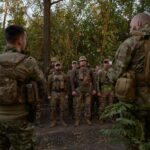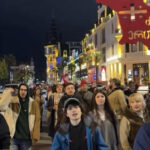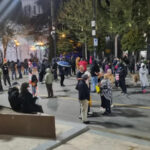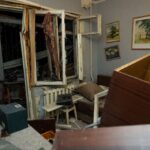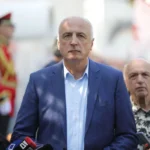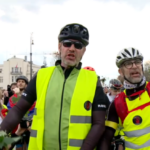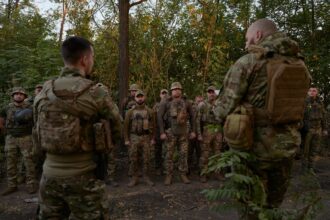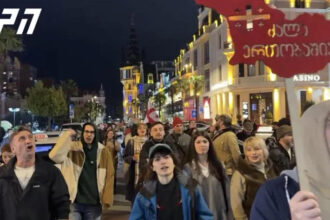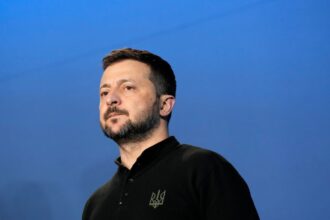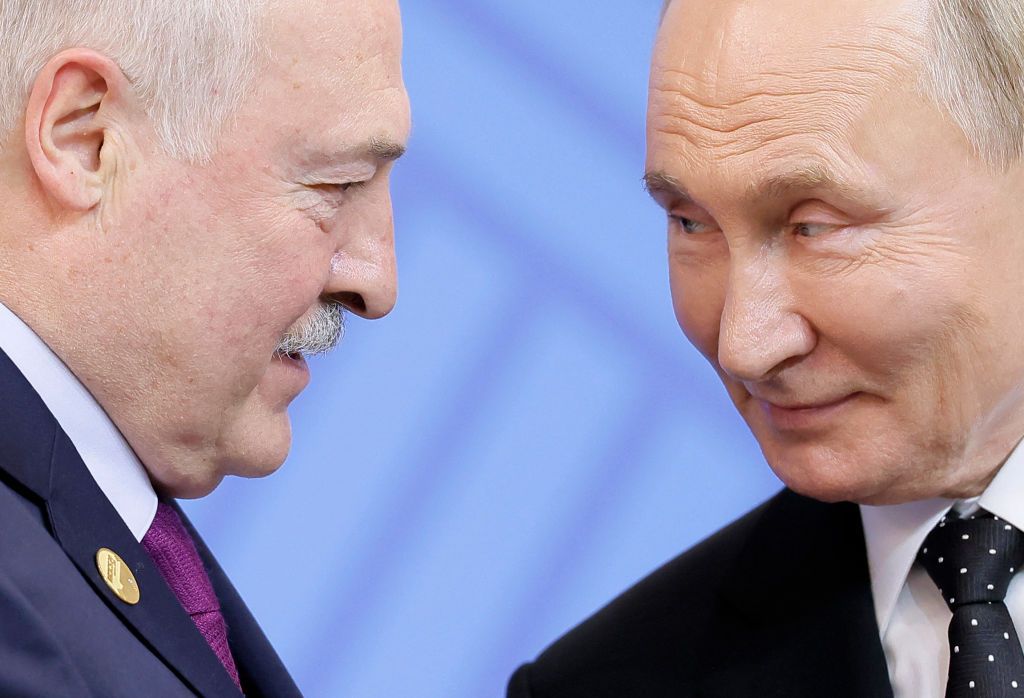Belarus rushes to hold a presidential vote, hoping to give Alexander Lukashenko victory six months before the official term ends.
Lukashenko said in an interview that North Korean troops fighting Ukraine would be “escalation.”
Belarus and Russia will hold major joint military exercises in September 2025.
Two Ukrainians are sentenced to 20 years of prison by a Belarus court for alleged terrorism.
Human rights activists claim that the prison where opposition leader Maria Kalesnikava is held is notorious for torture.
Belarus presidential campaign begins six months early
The Belarusian Central Election Committee registered on October 29 an initiative group that supports the presidential candidacy of Belarusian leader Alexander Lukashenko, while rejecting requests to register groups for other candidates.
This allows Lukashenko, in effect, to run unopposed for a seventh consecutive period of office. The election will be held on January 26, 2025.
Only Lukashenko’s group was registered at the first CEC. Now, Lukashenko’s regime and several other candidates have registered.
Aleh Haidukevich is the leader of the pro Lukashenko Liberal Democratic Party. He has been a supporter of Lukashenko’s since 1994. Alexander Hizhnyak is the leader of the pro Lukashenko Republican Party. He said that “Lukashenko was a good choice for president.”
Olga Chemodanova is another “candidate”. She was a former spokesperson for the interior ministry and supported the suppression of demonstrations and the persecution of the opposition. She said that she fully supports the president.
Belarus hasn’t held free or fair elections in the country since 1994, when Lukashenko took power. Lukashenko’s claim to have won the previous presidential election with 80% of votes sparked nationwide protests, and a subsequent crackdown against dissent.
In order to quell the opposition, Lukashenko’s regime closed down over 1,700 non profit civic organizations, banned all political parties loyal only to the regime and jailed more than 1,300 political prisoners.
The Belarusian Parliament approved the date of the seventh Belarusian Presidential Elections in late October. This is nearly half a calendar year earlier than the election legislation stipulated and a full month earlier than the previously reported date of February 23.
Ihar Karpenka of the Belarusian Central Election Commission justified the early election as necessary to kick-start the new “five year socio-economic cycle” with a leader “re-elected”. Some experts, on the other hand, attribute Lukashenko’s rush to hold the elections to his desire to secure a strong domestic political position before potential negotiations about Russia’s war against Ukraine.
RFE/RL’s political analyst Valer Karbalevich said that Lukashenko could be preparing for a future role in peace negotiations. Alexander Friedman also noted that the accelerated elections could be a prelude to a possible escalation of conflict.
Artsiom Shraibman, a political analyst, argues that Lukashenko held the early elections to reduce the risk of unrest.
Sviatlana Tsikhanouskaya, an exiled opposition leader, denounced the elections as a sham and accused Lukashenko’s government of running a ‘fake election process’ under an ‘atmosphere’ of terror.
Analysts in Belarus believe that the proposed tactics will not stop Lukashenko’s reelection, but they are the only way possible for voters to express their opposition to the authorities.
Yury Hubarevich of Tsikhanouskaya’s shadow cabinet tried to register as a candidate for the presidency, even though the opposition was urging Belarusians to vote against every candidate.
Hubarevich, who was registering for the elections, said: “We have to confirm in practical terms that only people approved by this regime will be allowed to participate.”
The current election law is biased against the exiled Belarusian Opposition: Only those who have resided in Belarus for at least 20 years are eligible to register as presidential candidates. They cannot hold foreign citizenship or residence. Most opposition activists have also been convicted in politically motivated criminal proceedings, which excludes them from running for president.
Russia has already backed Lukashenko. “We will be closely monitoring the election campaign,” Kremlin spokeswoman Dmitry Peskov said to Russia’s state broadcaster TASS.
Boris Gryzlov said earlier that Moscow would assist Minsk in the event of “attempts” to destabilize situations during the 2025 presidential election in Belarus.
Euroradio, an independent Belarusian media outlet, reported that as the election campaign approaches, the Belarusian Police have tightened the control over former political prisoners and those under house arrest. Lukashenko’s opponents are forced to attend police stations where they sign a formal warning prohibiting them from taking actions that would “change the constitutional order through force.”
Even Lukashenko claims that North Korean troops fighting in Ukraine would escalate the conflict
In an interview given to the BBC on October 23, Belarusian dictator Alexander Lukashenko denied reports that North Korean troops had been deployed in Ukraine. He said that such a move could be a “step towards escalation.”
Lukashenko said that he knew Putin’s character and that he would never try to convince another country to send its army to Russia to participate in the special operation in Ukraine. This was after Kyiv confirmed the news about the deployment of North Korean soldiers to Russia. Washington D.C. confirmed the deployment a few hours later.
Lukashenko said that any involvement of armed forces from another country would be an escalation step and would prompt NATO to send its troops into Ukraine.
“Even if (Belarus), we got involved in the conflict, this would be a road to escalation. Why? Lukashenko explained that you, the “Anglo-Saxons,” would immediately claim that another country was involved on one side… and NATO troops would then be deployed in Ukraine.
Russian propagandists often refer to English-speaking countries such as the United States, the United Kingdom and Canada, as “Anglo-Saxons.”
Belarus, despite being a staunch ally of Russia, has not sent troops to the front lines. The Russian military did use Belarusian infrastructure and territory to stage their failed assault on Kyiv during the early days of this all-out invasion.
Lukashenko denied that Belarus was responsible for the attack in the interview. According to him Putin was withdrawing troops from the Belarus-Ukraine Border but “was provoked”, to “turn” them against Kyiv.
In reality, Russian troops had been accumulating in Belarus and parts of Russia near the Ukrainian border for months. Russian troops also attacked Ukraine in the south and from the Russian occupied Crimea.
Lukashenko denied that he was asked to commit his troops on the battlefield. “Never. “Never. Neither he, Sergei Shoigu (former Defense minister), nor the current Defense Secretary Andrei Belousov have ever raised this question.”
Kyrylo Budanov was the head of Ukraine’s military Intelligence agency and he said earlier that the first North Korean unit would arrive in Kursk Oblast around October 23. Ukraine began a border incursion in August, and still controls large areas of territory.
Volodymyr Zelensky, the President of Russia, said that two brigades from North Korea with up to 6,000 soldiers each are currently training in Russia. According to military intelligence some North Korean officers have already been in the occupied territory of Ukraine, Zelensky stated on October 17.
North Korea denied the reports while Kremlin spokesperson Dmitry Peskov provided an evasive response.
Belarus and Russia to hold major joint military exercises in September 2025
Belarus and Russia will conduct joint strategic military exercises in Belarus between September 2025 and September 2025, Belarusian Air Force Commander Andrey Lukyanovich told Belarusian State-owned TV channel STV in an interview on October 28.
According to Lukyanovich’s statement, Russia and Belarus will conduct “operational-tactical exercises” with live fire in 2025. This will lead to a “joint strategy exercise” in September of 2025.
The Air Force Commander didn’t name the exercise. However, the announcement follows a meeting on Oct. 23 of the joint board between the Defense Ministries of both states which approved the concept for the “Zapad-2025”, joint strategic exercise of armed forces.
The previous Zapad exercise, which involved 200,000 Russian and Belarusian soldiers, was held in 2021. Belarus hosted approximately 12,800 of these troops. The “Union Resolve 2022” military exercise was then conducted, which was a cover for the Russian troops’ buildup on the Ukrainian border at the end of 2021 in preparation for Russia’s full scale invasion of Ukraine.
Belarus sentences two Ukrainians each to 20 years for alleged terrorism
According to the state-owned Belarusian news agency Belta, on October 23, a Belarusian court sentenced Serhiy Kabarchuk and Pavlo Kabarchuk, father and son, both from Ukraine, to each 20 years of prison for allegedly committing a terrorist act in Belarus.
The two were arrested on February 15, 2024 after allegedly trying smuggle explosives and weapons across the border to Belarus with the help of Ukraine’s SBU and State Border Guard Service.
The next day, Belarusian leader Alexander Lukashenko declared a successful “counter-terrorism operation” and a state television channel aired footage showing the Kabarchuks “confessing,” probably under duress. They had worked on orders from the SBU.
Colonel Andriy Demochenko, of the Ukrainian State Border Guard Service, dismissed the claims by saying that “Lukashenko’s absurdity is endless.”
The Kabarchuks trial began on September 26 in Homiel, a city in southern Belarus. The charges against the Kabarchuks included attempting a terrorist act and illegal handling of explosives and firearms, smuggling guns across the border and undercover activities. Belarusian authorities stated that both the father and his son cooperated with investigators.
According to the Viasna Human Rights Group, at least 12 Ukrainian citizens are being held in Belarus behind bars on false charges. Since the Russian invasion of Ukraine in which Belarus supported Russia and used its territory to attack Ukrainian targets, the pressure on the Ukrainians in Belarus has increased.
Human rights activists release report detailing torture in prison where opposition leader Kalesnikava was held
Penal Colony No. The International Committee for the Investigation of Torture has found that the 4th colony in the southern Belarusian town of Homiel which houses prominent Belarusian activist Maria Kalesnikava tortures political prisoners including placing them in an outdoor cage.
The report, which was presented on October 22, includes the testimonies of 20 political prisoners who were convicted following a crackdown in Belarus on dissent that followed protests over sham presidential election held in 2020. All the prisoners interviewed served their sentences in Homiel’s penal colonies No. All interviewed prisoners served their sentences in Homiel’s penal colony No. 4 between May 2020 and February 2024.
The report states that “one of the most heinous punishments is the cage situated on the colony territory at the checkpoint separating the residential and industrial zone,” According to reports, women are placed in the cage for up to 8 hours if they refuse to obey staff orders or have violent conflicts with their fellow prisoners.
Human rights activists have highlighted a number of repressive practices in the colony. These include the blocking of communication, denial of hygiene products, medical care, arbitrary punishments and the use of solitary.
According to Sergey Ustinov (co-founder of the International Committee for the Investigation of Torture In Belarus), political prisoners are subjected to retaliation for expressing their political views. The committee is a part of the International Accountability Platform of Belarus. This coalition of Belarusian human rights organizations and international human rights groups documents human rights violations committed by the Lukashenko government.
Kalesnikava, a high-profile political prisoner, is often placed in solitary confinement. They are isolated from other prisoners, and their fellow inmates are forbidden to speak to them.
Kalesnikava has been incommunicado since over 600 days after being admitted to intensive treatment for a severe medical condition developed while she was detained.
In comments to the BBC, Lukashenko said he was willing to consider Kalesnikava’s pardon request. He claimed that her family was denied visits because they “didn’t want her to visit them.”
Kalesnikava is malnourished according to her family members who are actively seeking Kalesnikava’s release. She weighs 45 kilograms (99 lbs) and stands 175 cm (5’7”) tall. They claim that prison food is not suitable for her condition and that they have had no contact with her.
Lukashenko, since July 2024 has released 115 of the 1,300 political prisoners of Belarus in four rounds of “pardons”, while simultaneously jailing more. Human rights activists added 115 names to Belarus’s recognized political prisoners list in July and August.
On September 16, the count grew again with 22 new names.
Maria Yeryoma, a Belarusian media manager, is a contributing writer at the Kyiv Independent. She was recently the director of commercial “special projects”, at TUT.BY, the largest independent online media outlet in the country. In May 2021, TUT.BY’s offices were raided by Belarusian authorities. 15 employees were taken into custody and the team was forced to leave the country in order to continue working. Maria moved to Kyiv, where she helped establish a new media outlet called Zerkalo.
Read More @ kyivindependent.com
